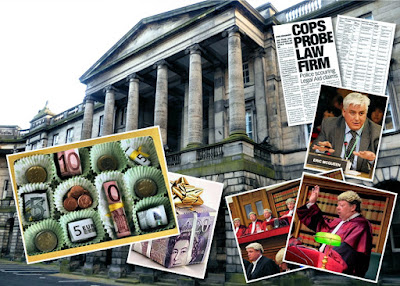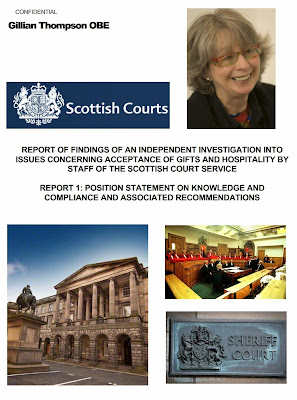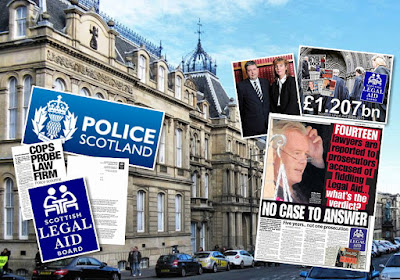 Police & Prosecutors investigate lawyers for legal aid fraud. THE Scottish Legal Aid Board (SLAB) has confirmed a number of solicitors are currently under investigation by Police Scotland for alleged legal aid fraud.
Police & Prosecutors investigate lawyers for legal aid fraud. THE Scottish Legal Aid Board (SLAB) has confirmed a number of solicitors are currently under investigation by Police Scotland for alleged legal aid fraud.
The admission by Legal Aid chiefs – via Freedom of Information legislation - comes after journalists received tip offs relating to “high value” long term investigations involving a number of law firms and solicitors chiefly in the west of Scotland.
And, all the solicitors who are under investigation by Police Scotland and the Crown Office & Procurator Fiscal Service (COPFS) - are still working for law firms who are able to claim more public cash – despite substantive allegations they cheated taxpayers.
Information provided by SLAB in response to a Freedom of Information request reveals:
The first was on an employee of a firm of solicitors and the estimated value of the alleged irregularities was £1,065.55 and as outlined above the matter is with Police Scotland.
The second was in respect of six solicitors. The estimated value of the alleged irregularities is yet to be determined as again, a Police investigation remains on-going.
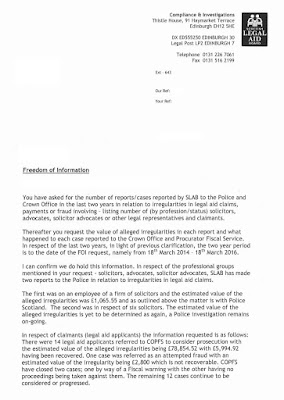 The Scottish Legal Aid Board also confirmed fourteen applicants for legal aid had been referred to the Crown Office.
The Scottish Legal Aid Board also confirmed fourteen applicants for legal aid had been referred to the Crown Office.
In respect of claimants (legal aid applicants) the information requested is as follows:
There were 14 legal aid applicants referred to COPFS to consider prosecution with the estimated value of the alleged irregularities being £78,854.52 with £5,994.92 having been recovered.
One case was referred as an attempted fraud with an estimated value of the irregularity being £2,800 which is not recoverable.
COPFS have closed two cases; one by way of a Fiscal warning with the other having no proceedings being taken against them. The remaining 12 cases continue to be considered or progressed.
However, since SLAB confirmed the Police probes - information has come to light a number of solicitors who are now banned from the Legal Aid register and some who have ‘voluntarily’ withdrawn after headline SLAB investigations - are still profiteering from legal aid cash.
The claims come as Scotland’s legal profession – led by the Law Society of Scotland – plot a strategy to resist ex Finance Secretary John Swinney’s announced cuts to the Legal Aid budget - which has soared to over £150 million a year - resulting in Scottish lawyers handed over £1.2 billion of public cash since the financial crash of 2008.
Enquiries by the media have also uncovered a new type of legal aid scam - whereby lawyers who currently cannot claim legal aid due to previous instances of defrauding the public purse - are now receiving hefty payments in the form of large referral fees from other local law firms they pass on civil & criminal clients.
The law firms who gain extra legal aid business from former legal aid solicitors – are suspected of inflating their own legal aid claims to cover referral fees paid to the referring solicitor.
One client - who did not wish to be identified - told journalists how his solicitor - already named in the media in relation to legal aid irregularities – passed on a civil damages claim against a West of Scotland local authority to another firm of solicitors in the same area.
The client later became aware an arrangement had been made by the second law firm for referral fees to be provided to the original solicitor.
The claimant was told if any problem arose or he was asked questions, he was to reply by stating his original solicitor was kept on in the case as his office was closer in terms of accessibility.
The client – who’s claim is being funded by civil legal aid – told journalists he was asked to go to three consultations with his original solicitor - all of which were suddenly cancelled at the last minute.
However, the client was asked to go to his new legal representatives for a consultation where his second lawyer claimed ‘valuable information had been learned from the consultations’ – which never took place.
Material which has emerged in relation to this case suggests the non-existent consultations – have since been charged up to legal aid.
A number of similar cases have since been identified involving the same solicitor who is now ‘de-registered’ from the Legal Aid register – potentially costing taxpayers tens of thousands of pounds in inflated legal aid claims designed to channel payments back from law firms still on the legal aid register - to the referring solicitor.
Most of the cases so far uncovered appear to involve small to medium sized civil claims against housing agencies, public bodies including health, local authorities and some private businesses.
Speaking to journalists, an individual who formerly specialised in complex financial investigations of law firms said the scale of fraud involving inflated legal aid claims being used to provide referral fees to de-registered and ‘non legal aid solicitors’ “is substantial” and “difficult to get to grips with”.
The individual also gave an account of a case where he alleged financial documents had been removed - under audit powers - from a law firm currently implicated in a multi million pound mortgage fraud racket – to shield a well known solicitor who formerly held high office at the Law Society of Scotland.
It is unknown if the Crown Office or Police Scotland have requested sight of the material from the legal profession’s regulator.
LAWYERS AVOID LEGAL AID RAPS:
A previous investigation by DOI into the lack of prosecutions by the Crown Office revealed fourteen cases were sent to prosecutors, with not one case going to court.
One solicitor even registered a plea of “insanity” to avoid being prosecuted for legal aid fraud.
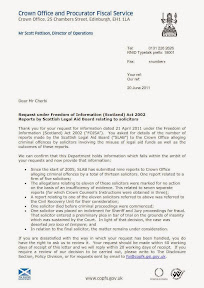 Since the start of 2005, SLAB has submitted nine reports to Crown Office alleging criminal offences by a total of thirteen solicitors. One report related to a firm of five solicitors;
Since the start of 2005, SLAB has submitted nine reports to Crown Office alleging criminal offences by a total of thirteen solicitors. One report related to a firm of five solicitors;
The allegations relating to eleven of these solicitors were marked for no action on the basis of an insufficiency of evidence. This related to seven separate reports (for which Crown Counsel’s Instructions were obtained in three)
A report relating to one of the eleven solicitors referred to above was referred to the Civil Recovery Unit for their consideration;
One solicitor died before criminal proceedings were commenced;
One solicitor was placed on indictment for Sheriff and Jury proceedings for fraud. That solicitor entered a preliminary plea in bar of trial on the grounds of insanity which was sustained by the Court. In light of that decision, the case was deserted pro loco et tempore; and
In relation to the final solicitor, the matter remains under consideration.
Further reporting on the lack of prosecutions was reported in the Sunday Mail newspaper and by DOI can be found here: FOURTEEN lawyers accused of multi-million pound legal aid fraud escape justice as Scotland’s Crown Office fail to prosecute all cases in 5 years
